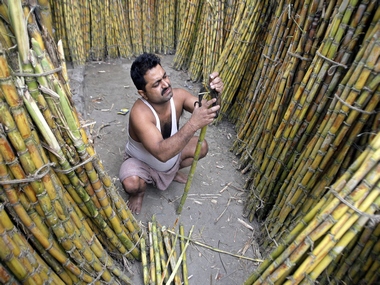The government has decided to free the sugar exports for the current season. India has removed any limit on sugar export volumes for no, adding pressure to global prices, but the world’s second-biggest producer could reinstate restrictions later if domestic supplies are threatened.
Ministers met to try to sort out conflicting views on sugar and other agricultural exports from one of the world’s biggest food producers.
[caption id=“attachment_296628” align=“alignleft” width=“380” caption=“The government remains anxious over supplies after having to import sugar following a severe drought in 2009, sending international prices spiralling upwards. Reuters”]  [/caption]
Sugar stocks like Shree Renuka Sugar, Balrampur Chini, Bajaj Hindustan, Dhampur Sugar Mills are rallying 3-6 percent today as the government placed the commodity under the open general licence category like wheat and rice. While Shree Renuka Sugars today touched an intra-day high of Rs Rs 32.80, the stock is currently up 4.38 percent. Bajaj Hindustan too toucjed an intra-day high of Rs 31.60 and is currently up 3.6 percent at Rs 31.10.
“Sugar exports have been freed, and there will not be any quantitative restriction, but we will stop it (exports) once it reaches a particular level,” the government source told reporters on condition of anonymity. The decision followed a series of policy flip-flops and delays to implementing overseas sales, which kept global markets on edge.
Agriculture Minister Sharad Pawar, a powerful ally of the coalition government, had called for more sugar exports beyond the 3 million tonnes already approved for the year to September 30, while the food ministry had dithered on an allocation mechanism.
India took a similar line on wheat and rice exports late last year, removing restrictions on sales but tacitly eyeing a limit in case global demand threatened domestic supplies.
Raw sugar futures sank 1.77 percent to 20.58 cents a lb by 1628 GMT, close to a one-year low, pressured by the potential extra exports and by the start of the harvest in Brazil, the world’s largest producer.
“The market does not need Indian export supplies, because the global market is in surplus,” said James Kirkup, head of sugar brokerage at ABN AMRO Markets in London, adding that prices could fall enough to make it unprofitable for Indian mills to export.
But the government’s decision to allow unlimited sugar exports into an already oversupplied market is likely to keep prices at hovering at one-year lows, but it could prove a sweet deal for buyers looking for bargains, dealers said today.
“The decision should relieve pressure on the Indian domestic market, but the immediate impact on the global market is evident: both whites and raws sustained further falls after the announcement,” said Tom McNeill, director of Green Pool, a commodities analyst based in Brisbane.
A severe drought in 2009 led India to import about 2 million tonnes after exporting the usual 5 million tonnes, which sent New York raw sugar futures rocketing to their highest level in nearly 30 years.
The government remains anxious over supplies after having to import sugar following a severe drought in 2009, sending international prices spiralling upwards.
In the current year, production is expected to be 26 million tonnes and domestic demand around 22 million tonnes, the second year of a surplus.
“The decision has come due to adequate supplies in the domestic market as production exceeded demand in the last couple of seasons,” said Harish Galipalli, head of commodities research at JRG Wealth Management.
“This a long awaited, positive step which will help the industry and farmers,” said Narendra Murkumbi, managing director of Shree Renuka Sugars, the country’s biggest sugar refiner which last week called for unrestricted exports.
Sugar mills, sitting on higher stocks than they need, owe 100 billion rupees to farmers, Abinash Verma, director general of the Indian Sugar Mills Association, a producers’ body, told Reuters on April 24.
The meeting of finance, food, agriculture and trade ministers with Prime Minister Manmohan Singh also agreed to set up a committee to agree on a long-term policy on grain exports. The issue has pitted Pawar, a champion of farmers, against the food ministry, which is concerned about domestic inflation.
Pawar has also clashed with Commerce Minister Anand Sharma over cotton exports, but on Monday these too were freed.
Reuters


)
)
)
)
)
)
)
)
)



